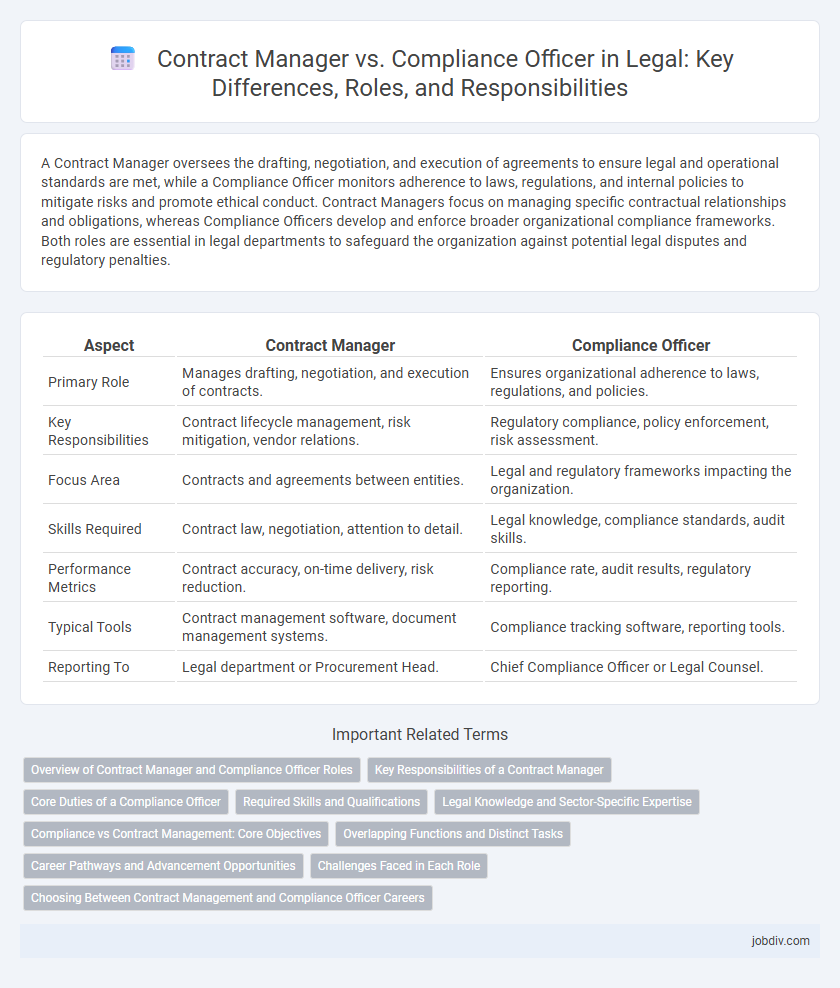A Contract Manager oversees the drafting, negotiation, and execution of agreements to ensure legal and operational standards are met, while a Compliance Officer monitors adherence to laws, regulations, and internal policies to mitigate risks and promote ethical conduct. Contract Managers focus on managing specific contractual relationships and obligations, whereas Compliance Officers develop and enforce broader organizational compliance frameworks. Both roles are essential in legal departments to safeguard the organization against potential legal disputes and regulatory penalties.
Table of Comparison
| Aspect | Contract Manager | Compliance Officer |
|---|---|---|
| Primary Role | Manages drafting, negotiation, and execution of contracts. | Ensures organizational adherence to laws, regulations, and policies. |
| Key Responsibilities | Contract lifecycle management, risk mitigation, vendor relations. | Regulatory compliance, policy enforcement, risk assessment. |
| Focus Area | Contracts and agreements between entities. | Legal and regulatory frameworks impacting the organization. |
| Skills Required | Contract law, negotiation, attention to detail. | Legal knowledge, compliance standards, audit skills. |
| Performance Metrics | Contract accuracy, on-time delivery, risk reduction. | Compliance rate, audit results, regulatory reporting. |
| Typical Tools | Contract management software, document management systems. | Compliance tracking software, reporting tools. |
| Reporting To | Legal department or Procurement Head. | Chief Compliance Officer or Legal Counsel. |
Overview of Contract Manager and Compliance Officer Roles
Contract Managers oversee the lifecycle of agreements, ensuring that contract terms are negotiated, drafted, executed, and fulfilled in accordance with legal standards and organizational policies. Compliance Officers focus on monitoring and enforcing adherence to regulatory requirements, company policies, and industry standards to mitigate legal and ethical risks. Both roles are integral to maintaining organizational integrity, with Contract Managers emphasizing contractual obligations and Compliance Officers prioritizing regulatory compliance.
Key Responsibilities of a Contract Manager
A Contract Manager oversees the drafting, negotiation, and execution of contracts to ensure compliance with company policies and legal requirements. They monitor contract performance, manage risks, and coordinate with stakeholders to resolve disputes or amendments. Their role is critical in safeguarding organizational interests and maintaining effective supplier and partner relationships.
Core Duties of a Compliance Officer
A Compliance Officer ensures that organizations adhere to legal standards, regulatory requirements, and internal policies, mitigating risks associated with non-compliance. Core duties include developing and implementing compliance programs, conducting regular audits, and providing training to staff on regulatory updates. Monitoring regulatory changes and reporting compliance status to senior management are critical responsibilities that safeguard the organization from legal penalties and reputational damage.
Required Skills and Qualifications
Contract Managers require strong negotiation skills, proficiency in contract law, and experience in risk management to draft, review, and manage agreements effectively. Compliance Officers need in-depth knowledge of regulatory frameworks, exceptional analytical abilities, and expertise in auditing and reporting to ensure organizational adherence to legal standards. Both roles demand excellent communication skills and attention to detail, but Contract Managers emphasize contract lifecycle management while Compliance Officers focus on regulatory compliance and policy enforcement.
Legal Knowledge and Sector-Specific Expertise
Contract Managers possess in-depth legal knowledge related to contract law, negotiation principles, and risk management, enabling precise drafting, review, and enforcement of agreements. Compliance Officers specialize in regulatory frameworks and sector-specific legislation such as GDPR in technology or HIPAA in healthcare, ensuring organizational adherence to these mandates. While Contract Managers focus on transactional legalities, Compliance Officers provide ongoing surveillance to mitigate compliance risks within industry-specific legal environments.
Compliance vs Contract Management: Core Objectives
Compliance Officers ensure organizations adhere to legal regulations and internal policies, focusing on risk mitigation and regulatory alignment. Contract Managers oversee the drafting, negotiation, and execution of contracts, aiming to safeguard company interests and maintain clear agreements. Both roles collaborate to balance legal compliance with effective contract performance, minimizing liability and operational disruptions.
Overlapping Functions and Distinct Tasks
Contract Managers oversee contract lifecycle management, ensuring terms, deliverables, and deadlines are met, while Compliance Officers focus on regulatory adherence and internal policy enforcement across all business operations. Both roles intersect in risk assessment and monitoring contractual obligations to prevent legal violations, but Contract Managers emphasize negotiation and performance tracking, whereas Compliance Officers conduct audits and implement compliance training programs. Clear delineation of responsibilities enhances organizational governance and mitigates legal exposure.
Career Pathways and Advancement Opportunities
Contract Managers typically advance through roles such as Senior Contract Manager, Contract Director, or Procurement Head, leveraging expertise in negotiation, risk assessment, and vendor management. Compliance Officers often progress to positions like Chief Compliance Officer, Compliance Director, or Regulatory Affairs Manager, emphasizing regulatory knowledge, audit skills, and ethical governance. Both career pathways offer strategic leadership opportunities but diverge in specialization--Contract Managers focus on optimizing contractual relationships, while Compliance Officers ensure adherence to legal and regulatory frameworks.
Challenges Faced in Each Role
Contract Managers often face challenges related to ensuring accurate contract drafting, negotiation risks, and maintaining clear communication between parties, which demands strong attention to detail and risk management skills. Compliance Officers encounter difficulties in interpreting complex regulatory requirements, monitoring adherence to evolving laws, and implementing effective internal controls to mitigate compliance risks. Both roles require navigating legal complexities but differ in focus; Contract Managers emphasize contract lifecycle management, while Compliance Officers concentrate on regulatory oversight and organizational governance.
Choosing Between Contract Management and Compliance Officer Careers
Choosing between contract management and compliance officer careers requires evaluating expertise in legal frameworks and organizational risk management. Contract managers specialize in drafting, negotiating, and enforcing agreements to safeguard business interests and ensure contractual obligations are met. Compliance officers focus on regulatory adherence, implementing policies to prevent legal violations, and managing internal audits to maintain corporate governance standards.
Contract Manager vs Compliance Officer Infographic

 jobdiv.com
jobdiv.com